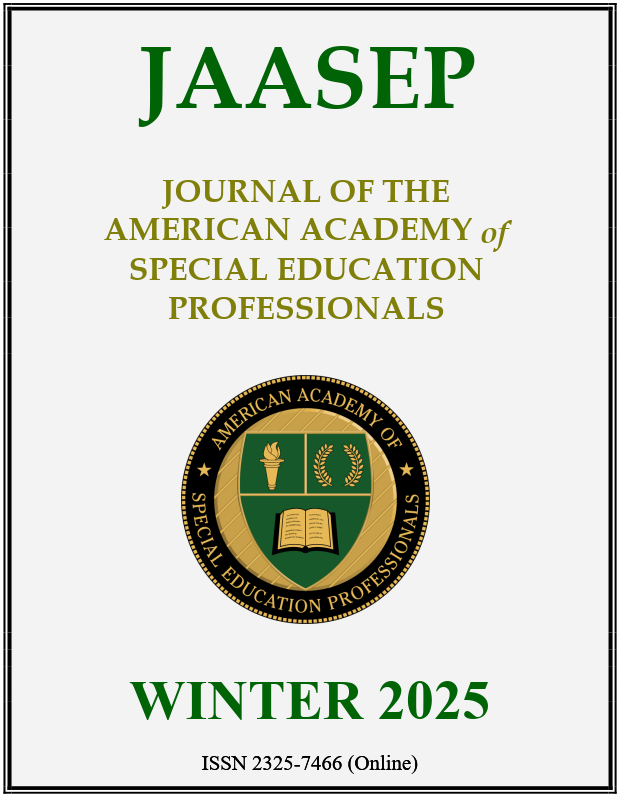Improving Transitions from Early Intervention (EI) to School: Strategies to Decrease Caregiver Stress and Increase Collaboration Between Families and School Professionals
Buren, M. K., Maggin, D. M., & Brown, C. (2020). Meta-synthesis on the experiences of families from nondominant communities and special education collaboration. Exceptionality, 28(4), 259-278. https://doi.org/10.1080/09362835.2018.1480953 DOI: https://doi.org/10.1080/09362835.2018.1480953
Buren, M. K., Maggin, D. M., & Kumm, S. (2022). A Study of Latina Mothers and Teachers’ Experiences with Home-School Partnerships in Special Education. Journal of Developmental and Physical Disabilities, 1-30. https://doi.org/10.1007/s10882-021-09807-8 DOI: https://doi.org/10.1007/s10882-021-09807-8
Burke, M. M. & Hodapp, R.M. (2014). Relating stress of mothers of children with developmental disabilities to family-school partnerships. Intellectual and Developmental Disabilities, 52, 13-23. https://doi.org/10.1352/1934-9556-52.1.13 DOI: https://doi.org/10.1352/1934-9556-52.1.13
Burke, M. M. & Goldman, S. E. (2018). Special education advocacy among culturally and linguistically diverse families. Journal of Research in Special Education Needs, 2, 1-12. doi:10.1111/1471-3802.12413 DOI: https://doi.org/10.1111/1471-3802.12413
Burke, M. M., Goldman, S. E., Hart, M. S., & Hodapp, R. M. (2016). Evaluating the efficacy of a special education advocacy training program. Journal of Policy and Practice in Intellectual Disabilities, 13(4), 269-276. https://doi.org/10.1111/jppi.12183 DOI: https://doi.org/10.1111/jppi.12183
Burke, M. M., Lee, C. E., & Rios, K. (2019). A pilot evaluation of an advocacy programme on knowledge, empowerment, family–school partnership and parent well‐being. Journal of Intellectual Disability Research, 63(8), 969-980. https://doi.org/10.1111/jir.12613 DOI: https://doi.org/10.1111/jir.12613
Division for Early Childhood of the Council for Exceptional Children. (2014). Official DEC recommended practices, 2014 Retrieved from https://divisionearlychildhood.egnyte.com/dl/tgv6GUXhVo.
Early Childhood Technical Assistance Center. (2022). Part B, section 619 of IDEA, Retrieved from https://ectacenter.org/sec619/sec619.asp.
Fontanesi, L., Marchetti, D., Mazza, C., Di Giandomenico, S., Roma, P., & Verrocchio, M. C. (2020). The effect of the COVID-19 lockdown on caregivers: A call to adopt urgent measures. Psychological Trauma: Theory, Research, Practice, and Policy. https://doi.org/10.1037/tra0000672 DOI: https://doi.org/10.1037/tra0000672
Fontil, L., Sladeczek, I. E., Gittens, J., Kubishyn, N., & Habib, K. (2019). From early intervention to elementary school: A survey of transition support practices for children with autism spectrum disorders. Research in developmental disabilities, 88, 30-41. https://doi.org/10.1016/j.ridd.2019.02.006 DOI: https://doi.org/10.1016/j.ridd.2019.02.006
Hadar, L., & Brody, D. (2010). From isolation to symphonic harmony: Building a professional development community among teacher educators. Teaching and teacher education, 26(8), 1641-1651. https://doi.org/10.1016/j.tate.2010.06.015 DOI: https://doi.org/10.1016/j.tate.2010.06.015
Harry, B., & Ocasio-Stoutenburg, L. (2020). Meeting families where they are: Building equity through advocacy with diverse schools and communities. Teachers College Press. Individuals with Disabilities Education Act, 20 U.S. C. 1400 et seq. (2004). https://doi.org/10.1007/springerreference-69963.
Lalvani, Pr. (2019). Constructing the (m)other: Narratives of disability, motherhood, and the politics of normal. Peter Lang.
Leiter, V., & Wyngaarden Krauss, M. (2004). Claims, barriers, and satisfaction: caregivers' requests for additional special education services. Journal of Disability Policy Studies, 15(3), 135–146. https://doi.org/10.1177/10442073040150030201 DOI: https://doi.org/10.1177/10442073040150030201
Magaña, S., Lopez, K., & Machalicek, W. (2017). caregivers taking action: A psycho-educational intervention for Latino caregivers of children with autism spectrum disorder. Family Process, 56, 59-72. doi:10.1111/famp.12169 DOI: https://doi.org/10.1111/famp.12169
Mandic, C. G., Rudd, R., Hehir, T., & Acevedo-Garcia, D. (2012). Readability of special education procedural safeguards. The Journal of Special Education, 45(4), 195–203. https://doi.org/10.1177/0022466910362774 DOI: https://doi.org/10.1177/0022466910362774
Mueller, T. G., Milian, M., & Lopez, M. I. (2009). Latina mothers' views of a parent-to-parent support group in the special education system. Research and Practice for Persons with Severe Disabilities, 34(3–4), 113–122. https://doi.org/10.2511/rpsd.34.3-4.113 DOI: https://doi.org/10.2511/rpsd.34.3-4.113
National Parent Technical Assistance Center (2016). Parent centers helping families. Self-publication.
Ocasio-Stoutenburg, L., & Harry, B. (2021). Case studies in building equity through family advocacy in special education: A companion volume to Meeting Families Where They Are. Teachers College Press.
Pianta, R. C., & Kraft-Sayre, M. (2003). Successful kindergarten transition: Your guide to connecting children, families, & schools. Baltimore: PH Brookes. https://doi.org/10.1207/s1532768xjepc1603_7 DOI: https://doi.org/10.1207/s1532768xjepc1603_7
Rios, K., Aleman-Tovar, J., & Burke, M. M. (2020). Special education experiences and stress among Latina mothers of children with autism spectrum disorder (ASD). Research in Autism Spectrum Disorders, 73, 101534. https://doi.org/10.1016/j.rasd.2020.101534 DOI: https://doi.org/10.1016/j.rasd.2020.101534
Rios, K., & Buren, M. (2023). Parents’ Experiences Transitioning From Early Intervention Services to School Services. Journal of Early Intervention, 10538151231159634. DOI: https://doi.org/10.1177/10538151231159634
Rios, K., Burke, M. M., & Aleman-Tovar, J. (2021). A study of the families included in Receiving Better Special Education Services (FIRME) Project for Latinx families of children with autism and developmental disabilities. Journal of Autism and Developmental Disorders, 1-15. DOI: https://doi.org/10.1007/s10803-020-04827-3
Shapiro, J., Monzo, L. D., Rueda, R., Gomez, J. A., & Blacher, J. (2004). Alienated advocacy: Perspectives of latina mothers of young adults with developmental disabilities on service systems. Mental Retardation: A Journal of Practices, Policy and Perspectives, 42(1), 37– 54. https://doi.org/10.1352/0047-6765(2004)42<37:aapolm>2.0.co;2 DOI: https://doi.org/10.1352/0047-6765(2004)42<37:AAPOLM>2.0.CO;2
Smalley, S. Y., & Reyes-Blanes, M. E. (2001). Reaching out to African American caregivers in an urban community: A community-university partnership. Urban Education, 36(4), 518-533. https://doi.org/10.1177/0042085901364005 DOI: https://doi.org/10.1177/0042085901364005
Walker, J. M., Shenker, S. S., & Hoover-Dempsey, K. V. (2010). Why do parents become involved in their children's education? Implications for school counselors. Professional School Counseling, 14(1), 2156759X1001400104. https://doi.org/10.5330/prsc.14.1.768th8v77571hm7r DOI: https://doi.org/10.1177/2156759X1001400104
Waters, C.L. & Friesen, A. (2019). Parent experiences of raising a young child with multiple disabilities: The transition to preschool. Research and Practice for Persons with Severe Disabilities, 44 (1), 20-36. doi:10.1177/1540796919826229. DOI: https://doi.org/10.1177/1540796919826229
Downloads
Article Information
- Article Type Articles
- Submitted December 27, 2024
- Published February 15, 2025
- Issue Winter 2025
- Section Articles
